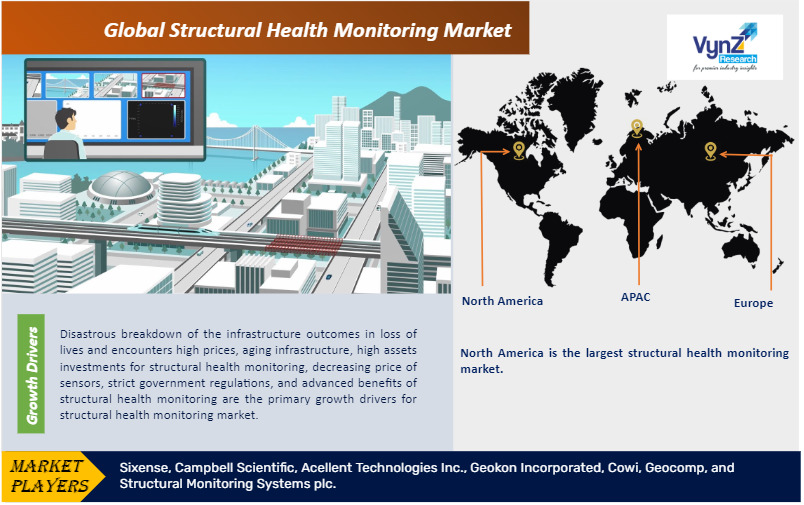Industry Overview
Structural Health Monitoring is the usage of non-destructive sensing and investigation of structural features, to identify a damage that has occurred at a specific location and evaluate its severity and consequences. The Global Structural Health Monitoring Market is growing at significant rate, due to disastrous breakdown of the infrastructure outcomes in loss of lives and strict government regulations. Different technologies contributed to the structural health monitoring market size. The market has witnessed high demand for wireless structural health monitoring in the coming years due to reduced cost of structural health monitoring and mounting demand of wireless technology.

Structural Health Monitoring Market Segmentation
Insight by Technology
On the basis of technology the structural health monitoring market is subdivided into wired structural health monitoring and wireless structural health monitoring. Among all technologies, wireless structural health monitoring segment is expected to grow at fastest rate in the market, due to mounting demand of wireless technology, as the usage of wires is eradicated, thus eliminating the requirement for installation and protection of cables which reduces the cost of structural health monitoring.
Insight by Offering
On the basis of offering the structural health monitoring market is subdivided into hardware and software & services. Among all offerings, the hardware segment accounted the largest share is in the market, as the hardware is the integral element, which measure physical properties of any construction under surveillance.
The hardware segment is further subdivided into sensors, data acquisition systems (DAS) and communication systems and others. The sensors segment accounted the largest share in the market. In addition, the software & services segment is further subdivided into software and services. In addition, the software and service segment is expected to grow at fastest rate in the market.
Insight by Vertical
On the basis of vertical the market is subdivided into civil infrastructure, energy, aerospace & defence, mining and others. Among the all verticals, the civil infrastructure accounted the largest share in the structural health monitoring market due to government investing in building infrastructural facilities, mounting infrastructure facilities and mounting government initiatives to monitor health of structure.
The growth of the civil infrastructure would increase the demand of structure health monitoring as to sustain and observe the health of every civil infrastructure and to prevent disastrous failure of these structures. The civil infrastructure segment is further subdivided into tunnels, dams, stadium, bridges, buildings and others. The bridges and dams account the largest share in the market.
Global Structural Health Monitoring Market Report Coverage
|
Report Metric
|
Details
|
|
Historical Period
|
2018 - 2023
|
|
Base Year Considered
|
2024
|
|
Forecast Period
|
2025 - 2030
|
|
Market Size in 2024
|
U.S.D. XX Billion
|
|
Revenue Forecast in 2030
|
U.S.D. XX Billion
|
|
Growth Rate
|
XX%
|
|
Segments Covered in the Report
|
By Technology, By Offering, and By Vertical
|
|
Report Scope
|
Market Trends, Drivers, and Restraints; Revenue Estimation and Forecast; Segmentation Analysis; Impact of COVID-19; Companies’ Strategic Developments; Market Share Analysis of Key Players; Company Profiling
|
|
Regions Covered in the Report
|
North America, Europe, Asia-Pacific, Middle East, and Rest of the World
|
Industry Dynamics
Structural Health Monitoring Market Growth Drivers
Disastrous breakdown of the infrastructure outcomes in loss of lives and encounters high prices, aging infrastructure, high assets investments for structural health monitoring, decreasing price of sensors, strict government regulations, and advanced benefits of structural health monitoring are the primary growth drivers for structural health monitoring market.
In addition, reduction of inspection cost, mounting government initiatives for public safety, usage of innovative sensor technologies, public–private enterprises for infrastructural progress, and integration technology are the major factors driving the growth of structural health monitoring market.
Structural Health Monitoring Market Challenges
High installation price, lack of skilled labors for installation, need for huge quantities of data processing and management, difficulty in installation and technical challenges are the major challenges for the growth of structural health monitoring market.
Structural Health Monitoring Industry Ecosystem
Globally industry players are leveraging market growth through launching new products. the manufacturing companies trying to enter the dental surgery instruments market are required to maintain stringent regulatory standards. Moreover, the high level of capital requirement also poses a major barrier for the entry of new players. This offers an edge to the established players in the industry competition.
Structural Health Monitoring Market Geographic Overview
Geographically, North America is the largest structural health monitoring market due to aging infrastructure such as tunnels, bridges and power plants. In addition, strict government regulations, acceptance of monitoring systems in various applications and usage of innovative sensor technologies are also up surging growth of the North American structural health monitoring market.
Moreover, Asia-Pacific is witnessed to observe highest growth in the market due to speedy infrastructural development. In addition, implementing stringent laws and regulations for construction and maintenance of structures, and huge number of infrastructure construction projects are some of the factors facilitating the growth of the Asia-Pacific structural health monitoring market.
Structural Health Monitoring Market Competitive Insight
Key players in the Structural Health Monitoring Market are catering the demand by collaborating, and acquiring with small players and investing on technologically advanced products across the globe. Acellent Technologies Inc collaborated with TESTIA GmbH for marketing commercialization and installation of Acellent’s structural health monitoring products. Sixense, Campbell Scientific, Acellent Technologies Inc., Geokon Incorporated, Cowi, Geocomp, and Structural Monitoring Systems plc are the key players offering structural health monitoring.
.png)



.png)